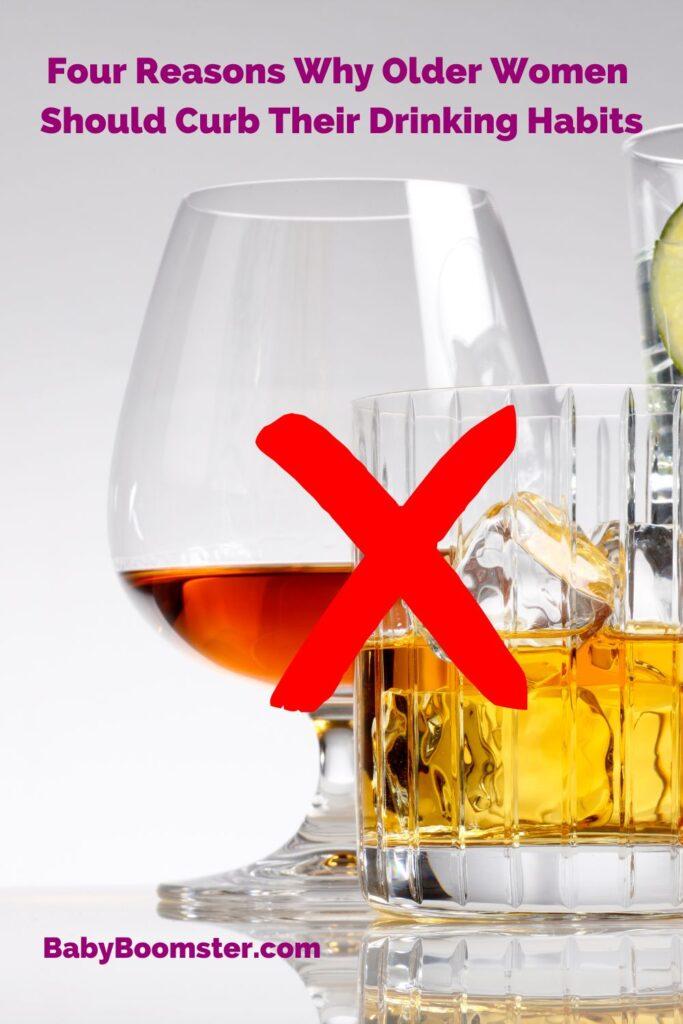If you are an older woman who enjoys a daily cocktail or two you may want to consider either curbing your drinking habits or cutting out alcohol completely. The reason is that the health benefits of doing so are extensive. What stops some women from giving up alcohol are common misconceptions such as hearing in the news how drinking is beneficial or how challenging it is to cut back or stop altogether.
It is never too late to make positive health changes, even if it involves something as socially accepted as alcohol.
Four Ways to Cut Back or Stop Drinking
Many women over 50 make the decision to cut back or stop drinking altogether. Others do not feel that a drastic lifestyle change like that is necessary because drinking is so socially acceptable, widely advertised, and marketed.
If you do decide to cut back on your drinking habits try the tips below:
- Keep track of the number of drinks that you consume daily or weekly. This may involve writing how much you drink on paper or using a food or diet app. This will help you place things into perspective when you look back at what you have consumed. It can also help you decide how many days a week you want to drink or how many drinks you want to consume within moderation.
- Decide the days you want to drink and plan your alcohol-free days. This will depend on how much you are consuming. If you drink four out of seven days a week and sometimes on the weekends; you may have a drinking problem. Try cutting back to one to two days of moderate drinking.
- In place of alcohol, consider non-alcoholic mocktails or low-alcohol beer or cocktails. The craft beer industry produces countless products that do not contain alcohol. Replace alcoholic drinks with non-alcoholic ones, or remove any alcoholic beverages from your home.
- Ask for support from family, friends, or your healthcare provider. Every heavy drinker’s situation is different. But it must be you who reaches out for help if you want to live a healthy lifestyle. It will make it easier if you have a support system or trustworthy advice.
Learn Patterns and Plan Ahead
In evaluating your alcohol use, you may find that you drink more in particular settings or in reaction to emotions, stress, or boredom. Taking the time to change your drinking habits makes planning and making positive changes easier.
Strive to develop new interests that do not involve alcohol. Find activities you enjoy where the attention is placed on your physical and mental well-being.
If giving up alcohol is challenging, consider avoiding people, places, or situations that may trigger a craving for a cocktail. “We have found that for anyone who is 50 and older, and has overcome an alcohol addiction, for example, staying healthy for the fun things in life, such as grandchildren, trips, or hobbies, makes it much easier to cut out things that are not necessarily healthy,” said the experts at Addicted.org.
The Myths Around Healthy Drinking are Misleading
Advertising campaigns for alcoholic drinks are effective and are geared toward specific demographics. Many products containing alcohol are advertised as clean, organic, low-calorie, sugar-free, or with an emphasis on a particular “healthy” ingredient.
Yet, they all contain ethanol, a type of alcohol that acts as a drug.
For most women who drink more than they should, the goal should be to drink in moderation, which is one drink or less in a day for women, as recommended by the 2020-2025 Dietary Guidelines for Americans.
However, most experts will agree that the only safe amount of alcohol to consume is none at all.
Alcohol is a Leading Cause of Death
Heavy drinking is a leading cause of death and disability globally. Yet, moderate drinking is often touted as a way to stay healthy. That remains debatable and can have harmful consequences as well.
Studies have shown that alcohol use is the seventh leading risk factor for death and disability in the later years of life. Among the population aged 50 and older, cancers caused by heavy drinking accounted for a large proportion of deaths, 27% among women 50 and older.
No one is saying you can’t consume alcohol responsibly. Still, the social acceptance of alcohol is high in today’s society, especially after the pandemic, placing more women 50 and older at more risk of health complications if they are steady drinkers.
The Effects of Alcohol as We Age
There are certain realities we have to deal with as we age. Most older women begin to make specific lifestyle changes that benefit their physical and mental health.
Alcohol can impact this, especially when it is not consumed in moderation. Older women, for example, are especially at risk for alcohol problems, as prior studies have shown:
There is an increased risk of alcohol-related health problems. Heavy drinking causes cancer, severe liver damage, a compromised immune system, and damage to the brain. It can also worsen health conditions Baby Boomers struggle with such as diabetes and high blood pressure.
The Red Wine Myth
The French Paradox, which refers to drinking wine and relatively low rates of heart disease, is not necessarily based on solid research. The argument that it can help avoid heart disease is pretty weak, and no consensus has been reached, says the experts studying cardiovascular health.
Alcohol use among older adults has been trending upward, especially after the pandemic. Despite most older adults drinking alcohol at a moderate level, a growing subset of older adults exceeds these levels.
Unfortunately, even drinking at moderate levels may increase the overall risk of death from different types of cancer or cardiovascular disease.
The Benefits of Cutting Down Alcohol Consumption
Most women 50 and older are beginning new chapters in their lives that are built upon strong family bonds, hobbies, new interests, traveling, or making new acquaintances.
Improving your physical and mental health will contribute to a healthy and prosperous life.
The benefits of cutting down or eliminating alcohol consumption include:
- Improved mental health
- Better long-term physical health
- Healthier appearance
- Better sleep and more energy
- Less financial stress
It is a personal choice for every woman. As we age, the lifestyle choices we make become more significant and impactful in their own way. The benefits of choosing to cut back or eliminate alcohol use have a favorable long-term effect on every facet of life.
About Marcel Gemme

Marcel Gemme has been helping people struggling with substance abuse for over 20 years. He started as an intake counselor for a drug rehabilitation center in 2000. With drug and alcohol problems constantly increasing, he utilized his website, Addicted.org, and community outreach to spread awareness. His primary focus is threefold: education, prevention, and rehabilitation.




I have no more than 4 drinks total a week. I am allergic to wine and beer and never consume them. I come from a family with many alcohol problems and I am well aware of the dangers, and as a result have been cautious all my life.. However, I found your post judgmental and heavy on opinion.
Hi Eileen, It sounds like what you are doing is reasonable. I also lived with an alcoholic for some time. Just curious, as this post was written by someone else other than me, what specifically did you find judgemental or heavy. I would love to know.